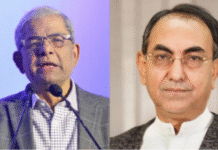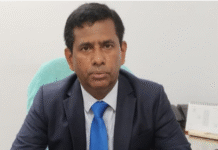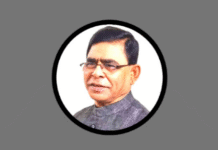
The Election Commission (EC) has many tasks in 2018, including organizing polls to at least five city corporations, but the biggest challenge by far would come from staging the 11th national election which the government wants scheduled for before the end of the year.
Under the terms of the constitution, a national election must be held during the final 90 days of a government’s tenure, meaning the next polls will take place between October 31 next year and January 28, 2019.
However, the incumbent Awami League government wants the polls to be held by the end of December 2018 and has informed the EC of its preference, according to sources.
While this would make the organizing of a free, fair and inclusive parliamentary election the biggest task by far for the EC in 2018, election commissioner Rafiqul Islam was unfazed.
“We do not want to call anything a challenge,” he said. “We want to get some major work done such as finalizing the voter list at the beginning of the year and holding the national election at the end.
“The government has appointed us to perform a task and we must do it. We will keep trying to perform the tasks flawlessly, with whatever capability we have.”
It has been nearly a year since former freedom fighter KM Nurul Huda took office as the country’s chief election commissioner. In that time, the EC has organized elections to two city corporations, by-polls and elections to some other local government bodies.
It announced a roadmap for the next national polls on July 16 this year and began by holding a series of dialogues with political parties and other stakeholders from July 31.
That consultation process concluded, the EC has now invited applications for the registration of new political parties and is examining whether the existing parties are observing the registration regulations. An updated list of registered parties is due to be published by the end of March.
Rafiqul said: “We are taking preparations for the national election, but we may face hurdles in performing some tasks. We do not know when the obstacles will come but if they do, we will try to overcome them to the best of our abilities.”
The commissioner said it was not possible to predict whether all of the registered parties would contest the election. “The EC does not have the power to force any party to take part in the election. The parties will come if they want,” he said.
“It will not be possible to bring them if they do not want to take part. It is correct that not all parties had taken part in all the elections. So, one cannot hope that everyone will participate in the polls. We want at least most of the parties to contest the polls,” he added.
As per the roadmap, the overall preparation for holding the national election will be completed by the end of July. This includes finalizing the polling stations, making arrangements for training of election officials, assigning centres for the national election, and collecting material for the election.
EC sources say work to update the voter list is ongoing as per the roadmap. The draft list will be published on January 1 followed by a revised final list on January 31.
According to the roadmap, the voter list of 300 constituencies will be printed by the end of June. Within this period, necessary amendments will be made to the Representation of the People Order and other laws and rules.
Former election commissioner Md Shah Nawaz said that although the current commission has started well, there are lessons to be learned from events surrounding the most recent national poll in January 2014, which was boycotted by the main opposition BNP.
“We had a good start like the incumbent commission (and) no questions were raised over elections we organized before the 10th parliamentary polls,” he said. “(But) our national election was not a good one as many parties had boycotted it and a section tried to thwart it.”
The previous Kazi Rakibuddin Ahmed-led commission had successfully organized the Rangpur City Corporation election and polls for the Khulna, Rajshahi, Sylhet, Barisal and Gazipur city corporations before it turned its attention to the 10th parliamentary election.
Following the boycott by the BNP and its allies, more than half of the parliament seats were elected unopposed in a low turnout and amid widespread violence.
The Rakibuddin-led commission could not escape the controversy. In the following elections to upazila parishads, zilla parishads, unions and municipalities, there were allegations of massive irregularities and exertion of influence by the administration.
Nawaz said the only challenge for the current EC was to organize a free, fair and acceptable national election. “This time, it seems all the parties will take part in the polls,” he said.
Dr Badiul Alam Majumdar, secretary of Sushashoner Jonno Nagorik (Sujan), a civil society platform for good governance, said: “It is correct that the commission has been successful but the success does not depend on the Election Commission alone. It will also depend on the government and the administration.”
He said a fair and peaceful election would be possible if the government acts neutrally, noting that the stake in a local government election and parliamentary polls were not the same, since governments can be changed through the national election.
Citing the example of the Rangpur City Corporation election, he said the EC was able to apply full strength in that election. “But it is not possible in the national election since voting will take place throughout the country,” he said.
Speaking about the previous EC, the election expert said the commission had successfully organized five city corporation elections in 2013.
“They were fair as the government did not try to influence them. But what we saw on January 5, 2014 was the complete opposite,” he said. “So, the local government elections do not forecast how the national election will turn out.”
Despite being commended for its good start, the Huda-led commission is set to miss its own December deadline to publish a gazette of the rearrangement of parliamentary seats.
EC sources say the complications stem from an attempt to amend the boundary law, and that the EC has already written to deputy commissioners and started collecting information on administrative rearrangement.
“There is no doubt that the new year will be a year of challenge for the Huda-led commission because they will have to organize the national election,” Jahangirnagar University’s international relations professor Dr Tareque Shamsur Rahman said.
“The elections to the Rangpur and Comilla city corporations were free and fair but that does not mean that all elections organized by them will be fair, particularly the national polls, because there is the question of a change of government.
“But I hope the commission will give its best to organize a free, fair, neutral and peaceful parliamentary election. Everyone will laud it if it succeeds (and) we will say that the commission has succeeded and passed the test with good marks.”
Source: Dhaka Tribune.










